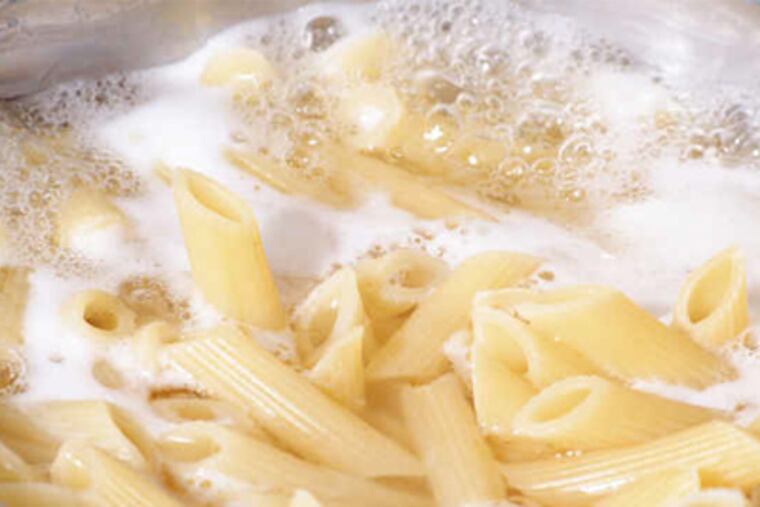GreenSpace: The water wasted in boiling pasta
Harold McGee had just dumped a big pot of pasta water into the sink and was waiting for his fogged eyeglasses to clear when he began to think about water.

Harold McGee had just dumped a big pot of pasta water into the sink and was waiting for his fogged eyeglasses to clear when he began to think about water.
Why was it necessary to boil pasta in so much of it? Could he use less? How much energy could he save?
This idle musing launched a quest for McGee, who writes a sciencey-cooking column called "The Curious Cook." He wanted to determine just how low he could go. As any box of pasta instructs, cooking a pound of it requires four to six quarts of water.
McGee tried two quarts. Then he went to 1.5 quarts. He had to stir a little more frequently, but the pasta turned out fine.
According to the National Pasta Association, Americans buy 1.35 billion pounds of packaged, dry pasta a year.
McGee did some quick calculations based on a billion pounds. Factoring in the energy to boil water, the inefficiency of burners and so on, he concluded that energy savings from using less water would amount to 250,000 to 500,000 barrels of oil a year.
Which would be equivalent to 5 percent of what Americans use driving in a day. At current prices, it would translate into savings of $18 million to $36 million.
I calculated further how much water the nation would save going with six cups instead of six quarts, and it was more than 500 Olympic-sized swimming pools.
Alas, one can aggregate just about anything and, as in this case, the result looks big.
But common sense tells me that the pasta water problem is picayune compared with our larger eco-footprints.
Indeed, it's absurd, ridiculous, silly.
But, of course, I love it.
I see it as symbolic: Waste is bad.
Maybe one day waste will even be as verboten as rudeness. You wouldn't let a door slam in the face of the person behind you. So why would you use a coffee cup made from their - and your - resources just once and then throw it away? Or boil pasta in excess water?
Not long ago, the folks on a sustainability list-serve in the region had a big debate going. They had seen an article more or less scoffing at the value of personal action when what the world really needs is political action. It was titled, "Forget Shorter Showers."
The New Yorker's Elizabeth Kolbert took a similar tack, belittling Colin Beavan's year-long adventure in eco-living. (Don't recognize the name? He became famous for not using toilet paper.) It's documented in his book and film, No Impact Man.
Kolbert said that for a sequel, perhaps he could successfully lobby for corporate and political change and call the new book Impact Man.
But isn't it hypocritical to go about badgering politicians and then continue to squander resources? Doesn't it come down to integrity? It's not so much about impact as accountability.
And, in a wacky way, it's about pasta water.
McGee wrote about his experience in his column and got more comments on that than on any previous ones.
He's still using less water, although not for eco reasons. "It's mainly because I'm lazy."
Boiling less water takes less time, of course.
Just the other night, I tried it myself.
With water in the pot, I put on a lid, which would conserve heat. A little over five minutes later, the water began bubbling.
I dumped in the pasta and stirred . . . Magnifico! It wasn't starchy. It wasn't sticky.
But like McGee, I wondered: What would the professionals think?
He consulted two lionesses of Italian cooking, Lidia Bastianich and Marcella Hazan. Both tried it, but had reservations.
So I called Philadelphia's Luca Sena, the Naples-born owner of Ristorante Panorama in Penn's View Hotel.
Few know pasta like Sena, who jokes that he's been cutting back lately. He's down to about six pasta meals a week.
Using less water was nothing new to him. "Honestly," he said, "you don't have to waste all that water."
Nor the energy. If you have a good pot and a good lid, turn off the burner shortly after the water boils and let the pasta finish cooking by itself.
Nor the flavor, which stays intense in less water. "If you overput the water, it's almost a sin," he says.
Sena has the amounts down pat. He uses just enough water so that it's gone by the time the pasta is almost cooked. Then he puts in the sauce - a creamy carbonara, perhaps - and finishes cooking the pasta in that.
"Now you have the flavor into the pasta," he says.
"Put a big bowl in the center of the table. And good bread. And buon appetito!"